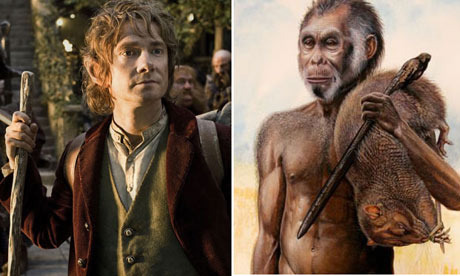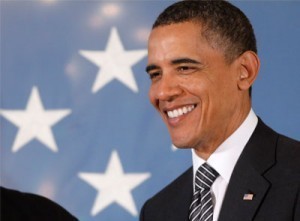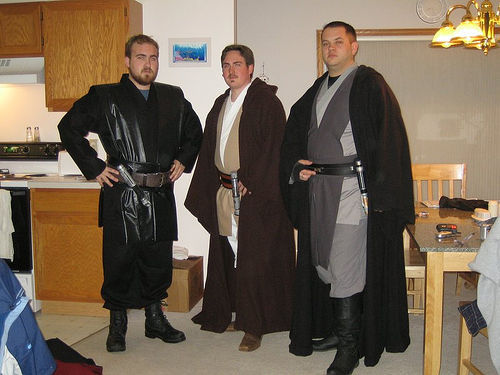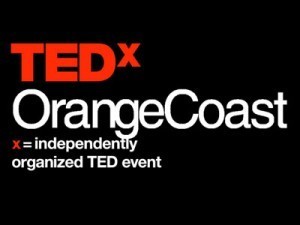Christopher Sprigman's Blog, page 5
November 9, 2012
Lord of the Dings

Remember a few years ago when scientists discovered the bones of a diminutive humanoid nicknamed “the hobbit”? Recently, in New Zealand, a scientist was set to give a public talk about the findings, and the talk was advertised using the title “The Other Hobbit.”
But,
when he approached the Saul Zaentz Company/Middle-earth Enterprises, which owns certain rights in The Hobbit, he was told by their lawyer that “it is not possible for our client to allow generic use of the trade mark HOBBIT.”
“I am very disappointed that we’re forbidden … to use the word ‘Hobbit’ in the title of our proposed free public event … especially since the word ‘Hobbit’ is apparently listed in the Oxford English Dictionary (and hence apparently part of our English-speaking vocabulary), the word ‘Hobbit’ (in the Tolkien context) is frequently used with apparent impunity in the written press and reference to ‘Hobbit’ in the fossil context is frequently referred to in the scientific literature (and is even mentioned in Wikipedia on Homo floresiensis). I realise I’m in unfamiliar word proprietry territory (as an earth scientist) … so I’ve gone for the easiest option and simply changed our event title.” said Alloway.
The event is now called “A newly discovered species of Little People – unravelling the legend behind Homo floresiensis”.
Amazing, and disturbing. You can read more here. Maybe we’ll get sued too.
November 8, 2012
Can Jewelry Be Copied?


We talk a lot about copying the fashion world on this blog, but one important caveat is that the rules that apply to clothing (in the US) are not the same as those that apply to jewelry. Jewelry is not functional, and as such is protected by copyright law. A recent story about Urban Outfitters illustrates this:
Urban Outfitters has pulled a necklace from its website, after a jeweler accused the company of ripping off the design.
Elena Howell, owner of Los Angeles-based TomTom jewelry, angrily Tweeted ‘WHY knock me off?’ as the retailer released a black and gold chain, which looked suspiciously similar to one of her creations.
However, shortly after her Tweet surfaced, the product disappeared from Urban Outfitters’ online store and Ms Howell said that she was promptly issued with an apology…
The designer later posted part of the letter on the Racked blog:
We saw your post on twitter today regarding our Sliced Triangle Necklace. This item was purchased from a vendor we work with and we had no knowledge of the similarities our necklace and TOMTOM Jewelry’s Future in Retrograde Necklace share. Please know that Urban Outfitters would never intentionally copy a designer’s work. We work very hard to avoid situations such as this. We are very excited to introduce TOMTOM Jewelry to Urban Outfitters and would hate to jeopardize our relationship.
November 7, 2012
What do the election results mean for IP?
 In the wake of President Obama’s solid re-election victory last night, we are left wondering (geeks that we are) about what (if anything) an Obama second term suggests about the future of IP law. We’ll talk mostly about copyright policy here: Any action on IP policy in the next couple of Congresses would probably focus on copyright, not least because we’ve just been through a substantial reform of the patent law and no one has any appetite to revisit that right away.
In the wake of President Obama’s solid re-election victory last night, we are left wondering (geeks that we are) about what (if anything) an Obama second term suggests about the future of IP law. We’ll talk mostly about copyright policy here: Any action on IP policy in the next couple of Congresses would probably focus on copyright, not least because we’ve just been through a substantial reform of the patent law and no one has any appetite to revisit that right away.
Even focusing only on copyright, the picture is far from clear. Millions of people joined in a wave of online activism back in January to defeat the copyright expansions offered in the SOPA and PIPA bills. But the coalition that defeated SOPA and PIPA is new and no one’s sure whether it’s a one-off or the beginning of a broader movement to slow, stop, or even reverse copyright’s relentless expansion. We’d note also that two of Hollywood’s favorite people in the House, Reps. Howard Berman and Mary Bono Mack, were both defeated last night. We doubt the losses have much to do with the pair’s outspoken copyright maximalism, but losing Berman and Bono is a further blow to a pro-copyright side that is still getting its collective head around the SOPA/PIPA debacle.
We’ll make a (tentative) prediction: In the short term, at least, the uncertainty following the defeat of SOPA and PIPA will lead to paralysis. We doubt that Congress will step up to the plate for any significant expansion of copyright, at least for now. Gigi Sohn of the online rights group Public Knowledge has issued a similar forecast.
The real question is what happens in the longer term. An increasing number of young people — the so-called “Digital Natives” — operate within an online environment in which they encounter norms and practices based around a freer environment for experiencing, sharing, and re-using content versus what the formal rules of copyright allow. Put more simply, the expectations of the Digital Natives, evidenced by their actual behavior online, are often at odds with the copyright law. And the collision between online culture and copyright is likely to have great salience for the Digital Natives — a group that values online freedom, both to consume and to create. We’re not really interested in whether these norms are right or wrong — moral judgment isn’t our comparative advantage. What interests us is how the political system will respond when the Digital Natives — who will comprise a larger share of voters soon — see instances of copyright invading their lives.
Our guess is that although copyright isn’t really an important national political issue now, it may well become one. And if it does, there are a couple of possibilities. First, if the GOP’s very deep losses last night prompt the party to take a good look at its future prospects, it’s possible that smart Republicans might conclude that elections will simply not be winnable in future unless the party finds a way to capture a larger share of the youth (and non-white) vote. One way to appeal to young people would be to identify with their interest in online freedom. And this would lead to a GOP that favors narrower copyright. This might be a good strategy for the GOP not least because the party doesn’t depend much now on Hollywood, compared with the Democrats, for whom Hollywood is a large source of support. If the GOP can drive a wedge between young people and Hollywood-loving Democrats, that may be worth doing.
Now, this is not the only plausible outcome, and the Democrats have a possible strategy of their own. Seemingly endless growth in Silicon Valley and the tech industry generally are both raising tech’s political profile, and leading to fights between Hollywood content providers and Silicon Valley tech companies — aka, content exploiters. And this presents a puzzle for Democrats. How to solidify ties to Silicon Valley while not cutting ties to Hollywood? The balancing act that’s necessary to keep both constituencies happy suggests that the Dems’ approach to copyright policy will no longer be limited to asking “what does Hollywood want?”. The question will be the more complicated one of “what can we do to help Hollywood while not angering the Valley and also alienating the youth vote that is a very important part of our winning coalition?”.
In any event, we are hopeful for a brighter future for copyright policymaking. One that does not simply look like a process of giving Hollywood whatever it demands, but instead, carefully balances the costs and rewards of copyright. Time will tell.
Faulkner Estate Sues Over Quotes in Movie
[image error]
You might think that the title to this post is a joke. But in fact, the estate of William Faulkner is suing Sony Pictures for its use of a famous line from Faulkner in Woody Allen’s Midnight in Paris.
In the film, Owen Wilson’s character, who gets taken back in time to Paris in the ’20s, says “The past is not dead! Actually, it’s not even past. You know who said that? Faulkner. And he was right.”
(What Faulkner actually wrote was “the past is not dead. It’s not even past.”)
The Faulkner estate’s claim rests on the idea that since this is a commercial use, it is not “fair use” to employ the quote in the film. Fair use is a legal doctrine that allows some copying that comports with certain criteria. “Commercial character” is mentioned in the relevant portion of the statute governing fair use, but it is not a determinative factor. Many commercial uses of others’ work have been upheld on fair use grounds.
What’s most interesting is that one of the 4 enumerated factors in a fair use analysis “the effect of the use upon the potential market for, or value of, the copyrighted work.” Does Woody Allen’s use of a (misquoted) line from Faulkner raise or lower the value of Faulkner’s original work?
The effect is surely very close to zero, but to the degree there is an effect, it is much more probable that it is positive. Midnight in Paris was a successful film; Faulkner, for a lot of people, is an unknown dead writer. Maybe some viewers of the film were inspired to read more Faulkner and buy his books. Who knows. But the idea that copying this one quite famous line into a film script is against the law underscores the dangers in overly broad interpretations of copyright law.
November 6, 2012
Will Disney Block Star Wars Fan-Made Content?
 Interesting post over at Techdirt about the future of fan fiction, which is inherently based on copying:
Interesting post over at Techdirt about the future of fan fiction, which is inherently based on copying:
We discussed recently how George Lucas relinquished control of the Star Wars franchise, selling it to Disney. As Leigh noted in that piece, critics have long chastised Lucas for the control he exerted over his films, as well as the meddling he did on the classics so many hold dear. While that criticism is certainly valid, one area where Lucas seemed to be open — in many ways bucking the Hollywood trend — was with fan-made content, such as fan films and fan fiction. In fact, Lucasfilm to a great extent embraced fan fiction, even going so far as to hold contests for such content. The fact that Lucasfilm gained rights ownership of those fan-made films led to some criticism, but at least the company wasn’t suing the jedi tunics off of its own fans.
But now some folks are wondering about the fate of all this fan-made content, and how future fan content will be received, now that the Empire /Disney controls the franchise.
November 5, 2012
The Knockoff Economy at TEDx
 Kal does a TEDx talk on the book in California, and talks about fashion, food, and Steve Jobs. Check it out, just below . . . .
Kal does a TEDx talk on the book in California, and talks about fashion, food, and Steve Jobs. Check it out, just below . . . .
Who owns a link? Google vs. European publishers . . .
 We have a new post up on the Freakonomics blog about the dispute between Google and a group of European newspapers. The papers want Google to pay them for the links to news articles that show up in Google users’ search results. Which would be a complete upending of the way that the Internet information environment works. Will the newspapers get what they want? It looks surprisingly likely . . .
We have a new post up on the Freakonomics blog about the dispute between Google and a group of European newspapers. The papers want Google to pay them for the links to news articles that show up in Google users’ search results. Which would be a complete upending of the way that the Internet information environment works. Will the newspapers get what they want? It looks surprisingly likely . . .
November 1, 2012
Who Owns Links?
The NY Times has an interesting story about an ongoing dispute in Europe between Google and European newspapers (and their supporters in government.) The issue is whether Google must pay for the privilege of linking to those sites, or should be able to link for free. Of course, at stake is how gains the revenue that comes from aggregating and compiling links. As the Times notes,
Google got rich by selling a simple proposition: The links it provides to other Web sites are worth a lot of money, so much that millions of advertisers are willing to pay the company billions of dollars for them.
Now some European newspaper and magazine publishers, frustrated by their inability to make more of their own money from the Web, want to reverse the equation. Google, they say, should pay them for links, because they provide the material on which the Web giant is generating all that revenue.
In several of the biggest European countries, they are close to getting their way.
You can read the rest here
October 30, 2012
Fictional Facts
[image error]
An interesting paper just posted on SSRN, the widely used database of working papers, addresses a great issue in copyright law: are made-up “facts” protected by copyright, or are they more akin to regular facts (that is, true facts) that are free for anyone to use and copy?
This is a less esoteric issue than you might think, since many popular works of fiction, from Seinfeld to Star Trek, have lots of “facts” that make up the alternative world the author created. And there is economic value in those facts–think of all the books that provide often painstaking detail on these fictional landscapes for legions of obsessed fans. One of the leading cases on point, for instance, involved the “facts” of Seinfeld.
Here’s the paper and abstract:
The Problem of Fictional Facts: Idea, Expression, and Copyright’s Balance Between Author Incentive and Public Interest” 
Journal of the Copyright Society of the U.S.A, Vol. 58, p. 549, 2011
MATT KELLOGG, Covington & Burling LLP
Email: mkellogg@cov.com
One of the central principles of copyright law is that an author may prevent others from using her expression but not her ideas. Known as the idea/expression dichotomy, this is how copyright law gives authors an incentive to create new works while ensuring that the public may continue to use and build on the ideas underlying those works. In practice, however, distinguishing expression from idea often proves quite difficult, and nowhere is this difficulty more apparent than in cases involving fictional facts.
Fictional facts are the building blocks that make up a work of fiction. Seen from the author’s perspective, they are unique creations that define the plot, characters, and setting of the work and are therefore deserving of protection. To the audience, however, these same fictional facts are the work’s abstract ideas and should be available for anyone to repurpose. Several important copyright decisions from the past fifteen years have centered on fictional facts, including disputes over a Star Trek viewers’ guide, a book of Seinfeld trivia, and, more recently, a Harry Potter encyclopedia. Yet little has been written on the doctrinal problems that fictional facts present or possible solutions that courts might implement.
To begin, this article offers an overview of how fictional facts are typically used and why both authors and audiences believe they are worth fighting over. It then explores the status of fictional facts under current copyright law. One decision in particular, Castle Rock Entertainment, Inc. v. Carol Publishing Group, Inc., made a lasting impact when the Second Circuit improperly introduced originality into its analysis of the idea/expression dichotomy. The article concludes with a proposal for a fictional-fact-specific infringement test that tries to balance author incentive and the public interest. In contrast to fair use, which provides an affirmative defense to infringement claims, this revised test considers whether copying fictional facts constitutes infringement in the first place.
October 29, 2012
The Knockoff Economy on The Engaging Brand
 Sprigman is interviewed by U.K.-based Anna Farmery, the host of business ideas show “The Engaging Brand.” A fun interview — take a listen.
Sprigman is interviewed by U.K.-based Anna Farmery, the host of business ideas show “The Engaging Brand.” A fun interview — take a listen.



